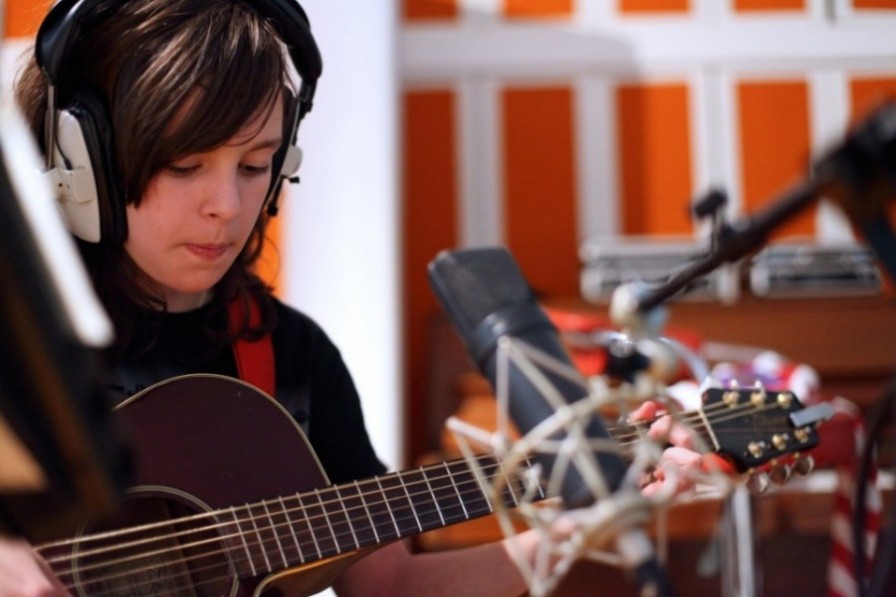What makes a valuable creative experience?

Exchanging Notes Project Manager Joe Harrison discusses whether prior musical skills and knowledge is essential for a valuable, high-quality creative experience.
Blueprint Studios is one of Manchester’s finest professional recording studios; home to Elbow, and listing Beyonce and Justin Timberlake amongst its previous clients. But today the musicians in the studio are a group of year 7s from Manchester Creative and Media Academy taking part in our Exchanging Notes project.
We’re often told that creativity requires that we acquire a set of predetermined skills and knowledge that we can then use to produce original ideas – you need to know your scales before you can write a song. As our students entered Blueprint Studios to record their track (which will eventually become a jingle for the school radio station they want to set up) many had only started playing their instruments a matter of weeks earlier, let alone learnt their scales or been accredited on their instruments. So the questions then arise; could they really get a full creative experience from only their minimal skills and knowledge? Even if they can record a piece of music would the product be of any quality? Would we not have been better spending the money on instrumental lessons at this stage, and save such high level experiences for further down the line?
There’s inevitably a certain amount of excitement as the group gets settled into the lounge space at Blueprint ready to start the recording process, but it’s amazing to see how the young people respond. The first group to record their parts are focused and determined to produce their best work. Unfazed by all the equipment around them, today they’re really responsive, listening closely to instruction from Phill, the practitioner on the project, or suggestions from each other. They really want to get this right.
While some record, others do a number of things. Some are practicing their parts in the lounge or just using the opportunity to play the instruments. I was frequently being asked to check if they were playing something right, or to teach them a new chord. Some sat (quietly!) in the control room watching the whole process and seeing how a professional studio works. Some made video blogs of the activity going on or interviewed their friends about their thoughts on the day (“Best day going!… We’ve been able to make our own music and I think that’s good”). There was also, as any musician knows, a whole lot of waiting around! Considering we’re there for a four-hour session, this causes minimal problems for the group and most found constructive ways to use the time, as demonstrated above.
Back in the control room, as we listen to the playback, conversations turn to the detail of people’s performances. Hearing themselves back, perhaps for the first time, has given some of them a real chance to see how they can develop their playing. Others listen with a creative ear, suggesting developments or additions. The experience is laying the foundations for their learning over the next few weeks.
So what’s the value of this experience then? Was it a worthwhile creative experience or would we have been better focusing on tuition? And what of the quality of the piece produced? In order to respond to these questions it’s important to see what happened over the following weeks.
At the start of the next weekly session the group came in with a new energy. Many got straight onto their instruments, or had an abundance of ideas they were keen to try out. Having heard themselves play in the recording at Blueprint many gave extra focus to their playing but there also appeared to be a deeper understanding of how all the different instruments fit together, how a band works, why cooperation is necessary to make music and where they fit into that.
Many also showed a real personal interest and love of music making. One of the guitarists has downloaded a guitar chords app and started to learn new chords practicing when possible with his uncle (also a guitarist) to help hone his skills. A few of the group started using the music room every day to play drums at lunchtime. This is something they are then sharing and developing with a wider circle of friends. Music is becoming a social tool. Another made the most of a forthcoming birthday to ask for a guitar.
As well as musical skills, we also saw personal and social skills developing. Some began to demonstrate leadership skills within the group. Some showed themselves to be calm, sensitive and thoughtful teachers. Others gained the confidence to offer ideas, and some showed real pride in their work. As well as all of this the shared experience tied the group together, thus helping communication and confidence across the group.
The Blueprint trip was the catalyst for all of this. It gave purpose to their learning. Their motivation was genuine and personal and therefore their commitment and interest was greater. It had opened their eyes to a new experience that offered huge creative potential. It brought music out of the abstract, another thing you do in school, and into a real and exciting world in which they can play an important part.

